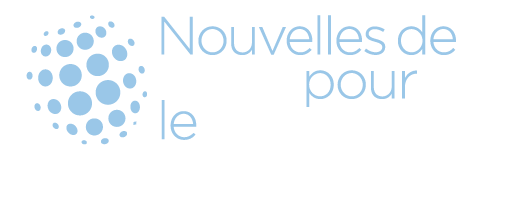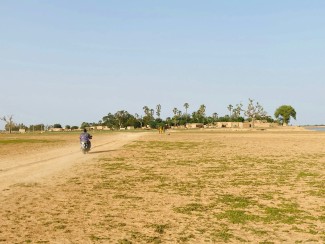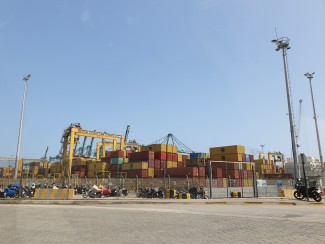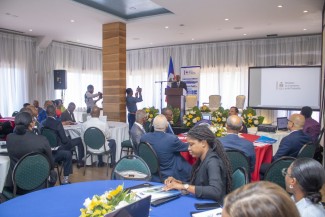Résultats clés
- Le partenariat entre le gouvernement du Soudan du Sud, le Cadre intégré renforcé (CIR) et le Programme des Nations Unies pour le développement (PNUD) aide le pays à réduire sa dépendance à l'égard du pétrole et à se rapprocher d'un commerce inclusif. Ces efforts profiteront à une plus grande part de la population, mais favoriseront aussi la paix.
- Le CIR a soutenu la mise à jour de la politique commerciale du Soudan du Sud au moyen d'un processus consultatif qui a impliqué des ministères et organismes publics, les milieux universitaires, le secteur privé et les partenaires de développement. Ce processus a aussi bénéficié des enseignements tirés des pairs au Rwanda et en Ouganda.
- Le CIR a soutenu l'intégration de stratégies commerciales essentielles du Soudan du Sud dans la version révisée de la Stratégie nationale de développement (2021‑2024) et dans l'élaboration du Cadre de politique commerciale.
- Le CIR a soutenu l'élaboration de l'étude "Le commerce pour la paix et la résilience au Soudan du Sud", publiée par le PNUD en 2021. L'étude est conçue pour accompagner la politique commerciale en vue de garantir que le commerce contribue à résoudre les conflits et à promouvoir la paix.
- Pour renforcer la capacité du gouvernement d'élaborer et de mettre en œuvre des politiques liées au commerce, le CIR a soutenu l'établissement d'une unité nationale de mise en œuvre (UNMO) au sein du Ministère du commerce.
- Le CIR a aidé à former des fonctionnaires pour qu'ils puissent participer efficacement aux négociations commerciales dans le cadre de l'Organisation mondiale du commerce (OMC) et de la Zone de libre‑échange continentale africaine (ZLECAf). En 2023, le CIR a soutenu le Comité directeur national du Soudan du Sud sur l'accession à l'OMC au moyen de formations auprès de l'Institut de gestion pour l'Afrique orientale et australe – Centre de formation aux politiques commerciales en Afrique (ESAMI‑trapca). Le renforcement des compétences aidera aussi le Soudan du Sud à accroître sa présence dans le secteur du commerce au sein de la Communauté d'Afrique de l'Est (CAE).
- En 2023, avec le soutien du CIR, la Gambie a reçu une délégation de haut niveau de la République du Soudan du Sud en vue d'établir des relations bilatérales entre les deux pays.
- Le soutien du CIR a permis au pays de participer au commerce numérique grâce au lancement d'un pôle de commerce électronique et à des formations sur son usage destinées aux micro, petites et moyennes entreprises (MPME).
Le Soudan du Sud poursuit un commerce régional, continental et international. Le plus jeune pays d'Afrique, qui compte un peu plus de 12 millions d'habitants[1], est déjà membre de la CAE. Avec le soutien du CIR et d'autres partenaires de développement dans le cadre de l'Aide pour le commerce, il vise à devenir Membre de l'OMC et partie à la ZLECAf.
Les recettes tirées des produits pétroliers, qui représentent plus de 90% des exportations du pays[2], ont joué un rôle important dans les progrès accomplis par le pays depuis son indépendance du Soudan en 2011. Cependant, le gouvernement du Soudan du Sud reconnaît que ce n'est pas une option durable pour faire sortir la population de la pauvreté, du conflit interne et des crises humanitaires persistantes, qu'aggrave encore la vulnérabilité aux changements climatiques et aux catastrophes naturelles. L'agriculture emploie 95% de la population[3] – mais seules 4% des vastes terres arables du Soudan du Sud sont cultivées, du fait de l'insécurité.
La voie vers le marché
Le partenariat du CIR avec le Soudan du Sud a débuté en 2013. Dans le cadre de son mandat, le CIR a pour tâche d'aider les pays les moins avancés (PMA), y compris les pays fragiles et touchés par des conflits, à utiliser le commerce comme pour outil pour un développement inclusif, conformément à l'objectif de développement durable n° 8 des Nations Unies, qui consiste à promouvoir des options durables pour un travail décent et pour la croissance économique. Ce soutien au commerce au service de la paix constituera une contribution au souhait du Soudan du Sud d'avancer vers une paix durable. Le partenariat a été axé sur l'élaboration d'un cadre institutionnel pour permettre au pays de commencer à participer au commerce mondial, ouvrant ainsi la voie à la participation de la population, qui pourra aussi tirer parti de la croissance économique, grâce à la création d'emplois.
Un soutien a été accordé par le biais d'un projet préparatoire initial, la pré‑étude diagnostique sur l'intégration du commerce (EDIC), un processus mené par le gouvernement, qui s'est inspiré des enseignements tirés au Rwanda et en Ouganda concernant l'intégration du commerce et l'assistance technique. La pré‑EDIC a préparé la voie pour permettre au Soudan du Sud d'élaborer des plans d'action définissant les bonnes pratiques en matière de réformes tarifaires, en vue de sa participation à la CAE. Les plans comprenaient aussi des orientations pour aider le pays à tirer profit de la libéralisation du commerce avec des pays non membres de la CAE.
La première EDIC du pays a été terminée en 2014, avec le PNUD comme principal partenaire de mise en œuvre. Elle a suscité un soutien supplémentaire pour l'établissement d'un cadre institutionnel pour l'Aide pour le commerce afin de renforcer la capacité du gouvernement d'élaborer et de mettre en œuvre des politiques liées au commerce. Une UNMO a été créée au sein du Ministère du commerce. Cela s'inscrit dans le cadre du mécanisme consultatif multipartite national du gouvernement – un arrangement national de mise en œuvre qui regroupe des parties prenantes du gouvernement et de ministères compétents, des représentants du secteur privé et des partenaires de développement, ainsi que le PNUD en tant que partenaire de mise en œuvre.
Fixer les modalités et conditions pour un commerce au profit des populations pauvres
Avec le soutien du CIR, une stratégie d'exportation nationale a été élaborée pour faciliter un accès accru aux marchés internationaux. La politique commerciale existante a été mise à jour au moyen d'un processus consultatif qui a impliqué des ministères et organismes publics, les milieux universitaires, le secteur privé et les partenaires de développement. Ce processus a aussi bénéficié des enseignements tirés des pairs au Rwanda et en Ouganda. Il a donné naissance à la Politique commerciale du Soudan du Sud (PC 2014), dont le réexamen a conduit à l'établissement d'un plan de mise en œuvre du cadre de politique commerciale. Le cadre de politique commerciale 2018‑2023 jette les bases de l'intégration dans la CAE et de la future accession à l'OMC.
Lors de son intervention à l'occasion de la validation du cadre de politique commerciale en 2018, M. Mou Mou Athian Kuol, Sous‑Secrétaire aux affaires de la CAE et représentant le Ministre du commerce, de l'industrie et des affaires de la Communauté d'Afrique de l'Est (MTIEACA), a déclaré:
Les MPME, notamment les entreprises dirigées par des femmes et des jeunes, ont été intégrées dans le cadre de politique commerciale pour veiller à ce que les avantages profitent à tous les membres de la société. Le cadre vise à connecter les producteurs aux chaînes de valeur, nationales, régionales et mondiales. L'égalité des genres, la conformité aux normes de travail, les obligations en matière de marchés publics et la durabilité environnementale sont autant d'aspects importants de ce cadre.
La PC 2014 a également permis l'intégration du commerce dans la Stratégie de développement du Soudan du Sud pour la période 2018‑2021 et dans le document sur le commerce au service de la paix.[5] L'étude sur le commerce au service de la paix et de la résilience, réalisée par la République du Soudan du Sud et le PNUD avec le soutien du CIR et publiée en 2021, a été conçue pour fonctionner parallèlement à la politique commerciale afin de garantir que le commerce contribue aussi à la résolution des conflits et à la promotion de la paix. Le document met en lumière les avantages d'un commerce qui permet de relier des régions longtemps isolées en raison des conflits et d'élargir les possibilités au‑delà de la simple subsistance. Il indique en outre qu'encourager les communautés locales et ethniques à faire du commerce avec d'autres groupes contribuera à accroître la résilience et à bâtir la paix en renforçant la confiance.[6]
Perfectionner les compétences dans les domaines de la négociation et de la diplomatie
Le CIR a soutenu le renforcement des capacités pour l'élaboration et la mise en œuvre de politiques commerciales nouvelles et actualisées, et pour garantir la durabilité. Le personnel de l'UNMO a été formé dans les domaines de la gestion, du suivi et de l'évaluation de projets, et de l'apprentissage. La formation a été dispensée aux fonctionnaires d'autres départements, dont les Douanes, le Bureau national de la statistique, l'Office national de normalisation, le Secrétariat de la CAE, le bureau du poste frontière à guichet unique de Nimule, et la Chambre de commerce du Soudan du Sud. De plus, 118 représentants du secteur privé ont reçu des renseignements sur la ZLECAf, y compris grâce à un échange Sud‑Sud sur le droit de la concurrence, conformément au Protocole de la ZLECAf sur la politique de la concurrence, adopté en vue de garantir que la concurrence favorise le commerce, une croissance inclusive et un environnement commercial équitable dans toute l'Afrique.
Le CIR a financé la présence de participants dans les dialogues régionaux et dans les formations sur l'accession à l'OMC. Parmi ces participants ont figuré des fonctionnaires techniques de haut niveau du MTIEACA et du Secrétariat de la CAE au Soudan du Sud. En 2019, le Soudan du Sud avait présenté son premier aide‑mémoire sur le régime de commerce extérieur à l'OMC et avait organisé sa première réunion du Groupe de travail.
En 2023, le CIR a soutenu le Comité directeur national du Soudan du Sud sur l'accession à l'OMC, au moyen de formations auprès de l'ESAMI‑trapca. Ce dernier est une institution de formation hautement spécialisée en matière de politique commerciale et de droit commercial pour les professionnels des PMA et des pays d'Afrique subsaharienne à faible revenu. Des hauts fonctionnaires ont également été formés dans le domaine de l'application du droit de la concurrence, pour la mise en œuvre de la Loi sur la concurrence de la CAE; cette formation a été assurée par l'Autorité de la concurrence du Kenya. Un soutien supplémentaire au renforcement des compétences a été fourni à 10 fonctionnaires principaux chargés du commerce, qui occuperont des postes d'attachés commerciaux. L'ESAMI‑trapca a également proposé une formation sur la diplomatie dans les domaines du commerce et de l'économie.
Les échanges de données d'expérience Sud‑Sud soutenus par le CIR demeurent essentiels pour renforcer les capacités commerciales du pays. En 2023, la Gambie a reçu une délégation de haut niveau de la République du Soudan du Sud, qui bénéficiait d'un soutien du CIR. La délégation a rencontré des représentants du Bureau du Président de la Gambie, des ministres et des représentants du secteur privé, et a visité des installations des secteurs public et privé. Une réunion de liaison a eu lieu avec la Chambre de commerce des femmes de la Gambie, le Centre du commerce international (ITC) et d'autres représentants du secteur privé en vue d'établir des relations bilatérales et d'en apprendre davantage sur les difficultés rencontrées par les entrepreneurs. Les échanges ont débouché sur un accord sur la participation du Soudan du Sud aux prochaines foires et expositions commerciales en Gambie, dans le but de promouvoir le commerce entre les deux pays. La Gambie et le Soudan du Sud encourageront désormais leurs entreprises à communiquer et à envisager de faire du commerce les unes avec les autres, comme tremplin pour augmenter les exportations dans le cadre de la ZLECAf.
Vérifier les progrès accomplis dans la révision des priorités
Une mise à jour de l'ÉDIC a été achevée en 2022, avec pour principal objectif de développer l'accès aux marchés pour le commerce des biens et services en vue de faire progresser le processus d'accession à l'OMC, la négociation de la ZLECAf et l'intégration dans le marché de l'Afrique de l'Est. La mise à jour de l'ÉDIC s'est penchée sur les normes et l'infrastructure, le commerce numérique et le commerce électronique, l'entrepreneuriat, le commerce sectoriel et la diversification économique.
La mise à jour de l'ÉDIC a également donné la priorité aux changements climatiques, notamment pour ce qui touche aux secteurs productifs clés du pays et à la diversification des chaînes de valeur vertes. Le Soudan du Sud est extrêmement vulnérable aux répercussions des changements climatiques. D'après la Direction générale de la protection civile et des opérations d'aide humanitaire européennes (2023)[7], quatre années d'inondations sans précédent ont entraîné des déplacements massifs de personnes et des destructions de cultures de grande ampleur. En 2021, le pays a élaboré son premier plan national d'adaptation (PNA 2021‑2025), dans le cadre du Programme de soutien mondial du PNUD et des Nations Unies pour les PNA en faveur de l'environnement, avec le soutien du Fonds pour l'environnement mondial.[8] Le PNA donne la priorité aux efforts visant à bâtir des communautés résiliente au changement climatique; à établir une trajectoire économique et de développement résiliente au changement climatique; et à favoriser un environnement et des écosystèmes résilients au changement climatique.
Le commerce électronique pour éliminer les obstacles au commerce
Le lancement, en 2022, du pôle de commerce électronique a constitué un jalon majeur du processus entrepris par le pays pour renforcer les activités commerciales. Ce mécanisme, financé par le Ministère du commerce du Soudan du Sud, le CIR et le PNUD, soutient la première plate‑forme de commerce en ligne du pays, www.dukaanye.com. En tant que pays sans littoral confronté à d'importants obstacles tarifaires, le Soudan du Sud tirera avantage d'une infrastructure électronique qui permet aux MPME de faire du commerce numérique sur les marchés locaux et internationaux.
Sept cents (700) MPME ont bénéficié d'une formation en 2022 sur divers aspects du commerce électronique, dont les compétences de base sur les technologies de l'information et de la communication, la gestion d'une boutique en ligne, la commercialisation sur les réseaux sociaux, l'analyse de données et la création de contenu numérique. Lors de son intervention au lancement de la plate‑forme en décembre 2022, M. Mou Mou Athian Kuol a dit son optimisme quant au potentiel de cette plate‑forme pour promouvoir l'entrepreneuriat, contribuer au développement d'un secteur privé inclusif, et créer des emplois:
Le pôle de commerce électronique est l'une des réalisations de la Stratégie nationale de développement révisée 2021‑2024, qui s'engage à créer des possibilités d'emploi grâce au développement de l'économie numérique. Il s'inscrit dans un projet plus vaste soutenu conjointement par le Ministre du commerce et de l'investissement, le CIR, le PNUD, la Banque africaine de développement et l'Ambassade des Pays‑Bas.
Le gouvernement a mis en place un cadre juridique pour réglementer ce secteur de l'économie en pleine croissance. La difficulté restante est le coût élevé du réseau mobile à large bande – le Soudan du Sud a l'un des tarifs mobiles les plus élevés en Afrique, et seuls 4% des habitants vivent à moins de 25 km d'un nœud optique.[10]
Une illustration de changement systémique
Les changements qui sont intervenus à ce jour au Soudan du Sud témoignent du changement systémique qui se déroule en coulisses. Le partenariat entre le gouvernement du Soudan du Sud, le CIR et le PNUD aide le pays à réduire sa dépendance à l'égard du pétrole et à se rapprocher d'un commerce inclusif. Ces efforts profiteront à une plus grande part de la population, mais favoriseront aussi la paix. L'objectif ultime est de développer des types d'emplois qui améliorent les conditions de vie et stimulent le développement économique durable.
Les politiques et cadres élaborés avec une appropriation totale de la part du gouvernement et incorporés dans diverses autres stratégies continueront d'orienter le commerce et l'investissement nationaux après la fin du soutien du CIR et du PNUD. Ils aideront le gouvernement à mobiliser davantage de ressources pour les priorités de l'Aide pour le commerce. Le gouvernement a déjà obtenu un montant de 5 millions d'EUR pour un projet concernant le commerce et l'emploi des jeunes, ainsi qu'un soutien au financement de la Banque africaine d'import‑export pour l'élaboration d'une stratégie d'exportation nationale en collaboration avec l'ITC.
Les progrès accomplis par le pays pour être "ouvert au commerce" sont particulièrement bien illustrés par la plate‑forme de commerce en ligne mentionné plus haut. Tout y est à vendre, des produits agricoles tels que du café et des avocats cultivés localement à du charbon activé, du beurre de karité, des produits de beauté à base de miel, et bien d'autres produits encore. C'est le signe évident que les MPME sont en pleine croissance au Soudan du Sud. Les politiques adéquates et un cadre pour un commerce inclusif se mettent en place et les Sud‑Soudanais sont prêts à tirer avantage des marchés, dans leur pays comme à l'étranger.
[1] Mise à jour de l'ÉDIC 2022.
[2] Mise à jour de l'ÉDIC 2022.
[3] Mise à jour de l'ÉDIC 2022.
[4] https://www.undp.org/south-sudan/news/south-sudan-ministry-trade-industry-and-eac-affairs-takes-steps-align-east-africa-community-standards.
[5] https://www.undp.org/south-sudan/publications/policy-brief-trade-peace-and-resilience-south-sudan.
[6] https://www.undp.org/sites/g/files/zskgke326/files/migration/ss/Trade-for-Peace_Policy_Brief_Low-res.pdf.
[7] https://civil-protection-humanitarian-aid.ec.europa.eu/where/africa/south-sudan_en.
[8] https://unfccc.int/sites/default/files/resource/South-Sudan-First-NAP%20.pdf.
[9] https://www.undp.org/south-sudan/news/undp-south-sudan-and-ministry-trade-industry-launch-new-e-commerce-hub.
[10] Mise à jour de l'EDIC 2022, page 260.
If you would like to reuse any material published here, please let us know by sending an email to EIF Communications: eifcommunications@wto.org.



